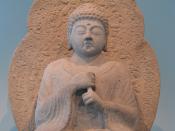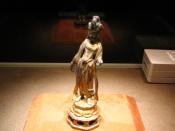Humanities 2420: Introduction to Korean Culture - First Assignment
The period during the Three Kingdoms and Unified Silla was a daunting time, that is, for people who were not of noble blood. Political and social structures such as governments, councils, and the military were systematically put in place, and removed at will by the power of the throne solely based on how it affected the upper crust of society. However, this consistency, and societal acceptance allowed each respective civilization to endure, grow, and at times even, flourish. The Three Kingdoms and Unified Silla's emphasis on a government, and way of life based upon hereditary biases, and a clear distinction between its own people, provided them with the appropriate blueprint to sustain their own political and social structures. Systems, such as, and similar to the bone-rank system numerically categorized each individual's position in their society thereby providing a clear outlook on each person's roles and responsibilities.
The adaptation, and acceptance of Buddhism by the lower class eased the transition into an extremely prevalent authoritarian government. And the strict control, and manipulation of the military by the throne paved the way for each civilization to fight for more land, and defend against incoming invasions.
Military authority and action in the Three Kingdoms and Unified Silla was always under royal jurisdiction, but more specifically, the king's. Plans of war, times of attack, and times of surrender were always decided upon by the upper echelon of society. Not only did the higher class dictate the overall goals, and aims of the military, but they also consumed the key positions themselves within the military as well. In Silla, garrisons of true-bone status were established, and elite unites would only be composed of those who were from elite lineages while peasants, and farmers would hold...


